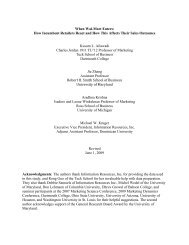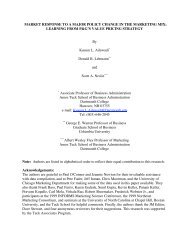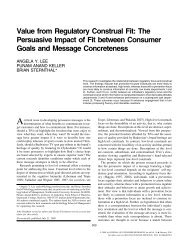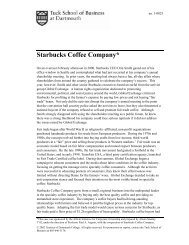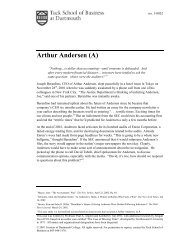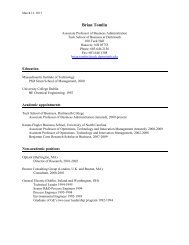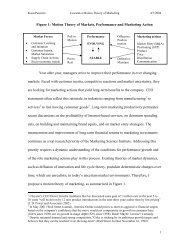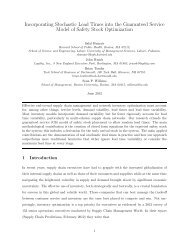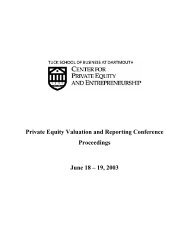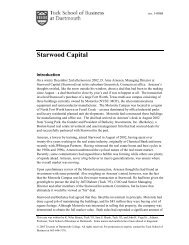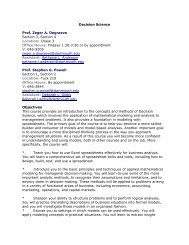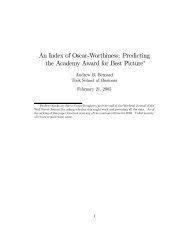tax notes international - Tuck School of Business - Dartmouth College
tax notes international - Tuck School of Business - Dartmouth College
tax notes international - Tuck School of Business - Dartmouth College
You also want an ePaper? Increase the reach of your titles
YUMPU automatically turns print PDFs into web optimized ePapers that Google loves.
expenses were unjustified and that the services were<br />
actually performed by the Russian <strong>of</strong>fice.<br />
In a similar case, Russia’s Higher Arbitration Court<br />
on January 20 quashed a RUB 260 million claim for<br />
back <strong>tax</strong>es against the Moscow branch <strong>of</strong> PricewaterhouseCoopers,<br />
according to media reports. The<br />
<strong>tax</strong> authorities had accused PwC <strong>of</strong> illegally deducting<br />
consulting service payments made to PwC’s Dutch<br />
branch, saying those services were actually performed<br />
by the Russian <strong>of</strong>fice. (For prior coverage, see Tax Notes<br />
Int’l, Apr. 21, 2008, p. 230, Doc 2008-8429, or2008<br />
WTD 75-1.)<br />
Spain<br />
♦ Kristen A. Parillo, Tax Analysts.<br />
E-mail: kparillo@<strong>tax</strong>.org<br />
Directors’ Remuneration Not<br />
Deductible, Supreme Court Says<br />
Spain’s Supreme Court recently issued two judgments<br />
denying corporate income <strong>tax</strong> deductions for the<br />
remuneration <strong>of</strong> directors <strong>of</strong> a public limited company<br />
(PLC). The November 13, 2008, judgments (2578/2004<br />
and 3991/2004), which were only recently made public,<br />
have caused quite a debate.<br />
The Tax Inspectorate had initiated two separate proceedings<br />
against a PLC, claiming that the directors’<br />
remuneration it had included as a deductible expense<br />
did not qualify.<br />
After exhausting all appeal procedures, the company<br />
brought its case to the Supreme Court, which also concluded<br />
that the directors’ remuneration was nondeductible.<br />
The company’s bylaws described the directors’<br />
remuneration as ‘‘a fixed amount that could be reviewed<br />
annually, in addition to a share <strong>of</strong> the company’s<br />
pr<strong>of</strong>its in line with the limits laid down by legislation.’’<br />
In its interpretation <strong>of</strong> the current Public Limited<br />
Companies Act and <strong>of</strong> section 13(ñ) <strong>of</strong> the Corporate<br />
Income Tax Act 1978 (now abrogated), the Court concluded<br />
that for the remuneration <strong>of</strong> the directors <strong>of</strong> a<br />
PLC to be <strong>tax</strong> deductible, the company bylaws must<br />
specify the directors’ remuneration ‘‘with certainty.’’<br />
The remuneration will be considered certain if it meets<br />
the following conditions:<br />
(a) the bylaws must specify a definite earnings<br />
system and not contemplate several systems from<br />
which the board <strong>of</strong> directors can choose;<br />
(b) for variable earnings based on pr<strong>of</strong>it sharing,<br />
the bylaws must establish a definite percentage,<br />
and not a maximum percentage; and<br />
SPAIN<br />
(c) for fixed earnings, the bylaws must establish a<br />
definite amount, or alternatively, must establish<br />
criteria to calculate the exact amount without<br />
leaving scope for discretion.<br />
The Court’s conclusions, which appear to diverge<br />
from the current corporate income <strong>tax</strong> regulation,<br />
could have significant practical repercussions.<br />
The finding on fixed remuneration in point (c) is<br />
particularly controversial because the bylaws <strong>of</strong> many<br />
companies define directors’ remuneration as a fixed<br />
amount to be established every year by the general<br />
shareholders meeting.<br />
Points (a) and (b), on the other hand, reflect existing<br />
common practice: The bylaws must specify the earnings<br />
system, and, in the case <strong>of</strong> variable earnings, they<br />
must specify a definite percentage <strong>of</strong> pr<strong>of</strong>it sharing.<br />
Under the previous regulation on corporate income<br />
<strong>tax</strong> (section 13(ñ) <strong>of</strong> the Corporate Income Tax Act<br />
1978) applicable to the fiscal years subject to the Supreme<br />
Court’s analysis, for an expense to qualify as <strong>tax</strong><br />
deductible, it must be a mandatory expense and, therefore,<br />
necessary for the company to engage in its activity.<br />
The current regulation does not refer to those requirements.<br />
It states that an expense is considered <strong>tax</strong><br />
deductible if the company enters it into its books and<br />
meets the conditions <strong>of</strong> the commercial regulation on<br />
directors’ remuneration. Thus, controversy may arise if<br />
the <strong>tax</strong> authorities rely on the Supreme Court’s judgments<br />
and not on the criteria <strong>of</strong> the Directorate General<br />
<strong>of</strong> Registries and Notarial Affairs (Dirección General<br />
de los Registros y del Notariado), concluding that<br />
companies that do not specify the remuneration<br />
amount in their bylaws are in breach <strong>of</strong> the commercial<br />
regulation. This would result in the remuneration<br />
<strong>of</strong> the directors not being <strong>tax</strong> deductible.<br />
This risk is limited to PLCs and does not extend to<br />
limited liability companies (the most common type <strong>of</strong><br />
company in Spain). Under section 66.3 <strong>of</strong> the Limited<br />
Liability Companies Act, fixed remuneration ‘‘will be<br />
set every fiscal year by agreement <strong>of</strong> the shareholders<br />
general meeting.’’ The act itself thus prevents LLCs<br />
from establishing a definite amount in their bylaws,<br />
stating that the shareholders general meeting must set<br />
the amount annually.<br />
The Court’s judgments <strong>of</strong> November 2008 are especially<br />
relevant for listed PLCs. The Spanish <strong>tax</strong> authorities<br />
may consider that the remuneration those companies<br />
pay to their directors is nondeductible if their<br />
bylaws do not specify a definite remuneration amount,<br />
or alternatively, the criteria needed to calculate the exact<br />
amount without leaving scope for discretion. Therefore,<br />
it is important to pay close attention to how the<br />
TAX NOTES INTERNATIONAL FEBRUARY 2, 2009 • 407<br />
(C) Tax Analysts 2009. All rights reserved. Tax Analysts does not claim copyright in any public domain or third party content.



